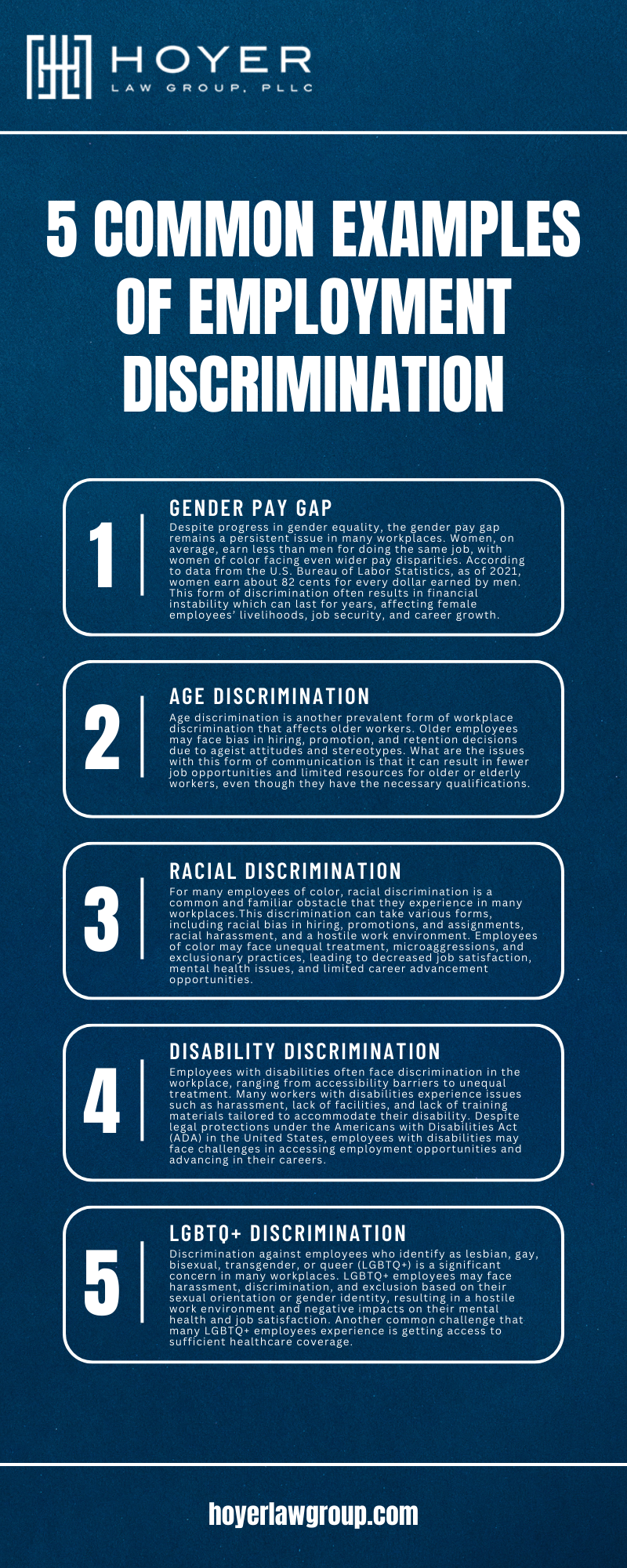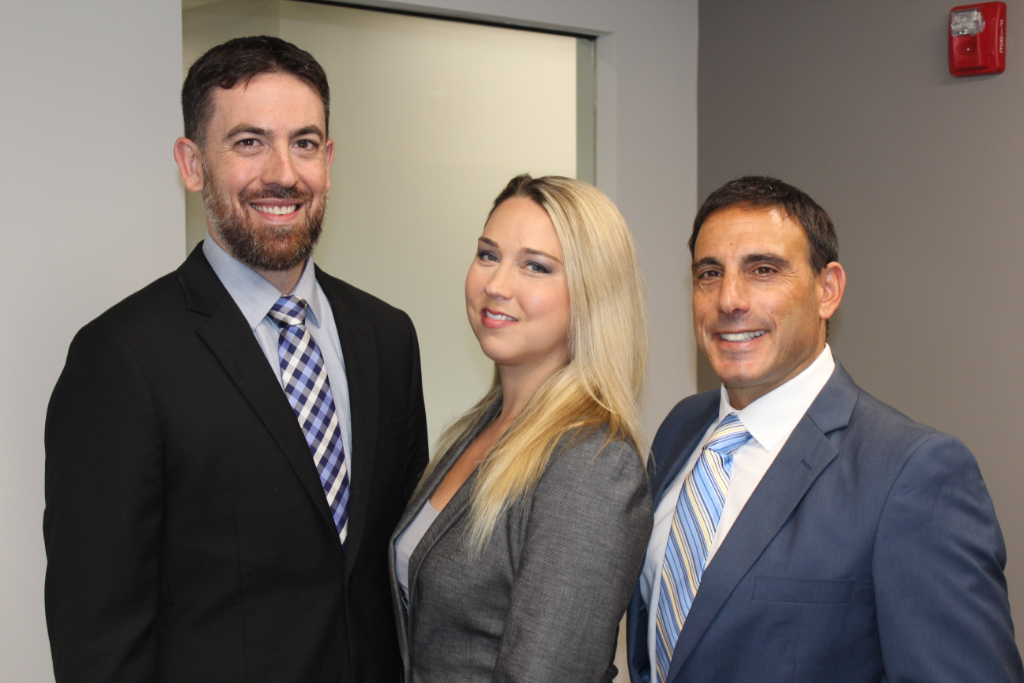Employment Discrimination Lawyer Tampa, FL
 Our Tampa, FL employment discrimination lawyer knows that the majority of workers in the United States have a federally protected right under the Family and Medical Leave Act (FMLA) to take up to 12 weeks off from work, unpaid, to care for themselves or a close family member who is sick or injured and not have to fear losing their job or being discriminated against or retaliated against. If you believe that you are an employee who is eligible for FMLA protection but are worried that your employer has unlawfully violated your FMLA rights, you should consult with an experienced employment discrimination lawyer as soon as possible.
Our Tampa, FL employment discrimination lawyer knows that the majority of workers in the United States have a federally protected right under the Family and Medical Leave Act (FMLA) to take up to 12 weeks off from work, unpaid, to care for themselves or a close family member who is sick or injured and not have to fear losing their job or being discriminated against or retaliated against. If you believe that you are an employee who is eligible for FMLA protection but are worried that your employer has unlawfully violated your FMLA rights, you should consult with an experienced employment discrimination lawyer as soon as possible.
Table Of Contents
- Fighting Employment Discrimination
- 5 Common Examples Of Employment Discrimination
- Employment Discrimination FAQ
- Get In Touch With Hoyer Law Group, PLLC
- 5 Common Examples Of Employment Discrimination
- Tampa Employment Law Statistics
Examples of When a Person Can Take Time Off Under the FMLA
There are many instances when a worker can take unpaid leave from their job under the FMLA. A few typical examples include:
- When the worker is ill, injured, or has a serious medical condition
- When the worker needs to provide care for his or her spouse, child, or parent who has a serious medical condition or illness
- When the worker is incapacitated due to pregnancy
- When the worker needs prenatal care before a childbirth
- Childbirth
- When the worker needs to provide care to his or her newborn child
- Placing a child up for adoption or into foster care
How Do Workers Use FMLA Leave?
When a worker has notice ahead of time that he or she will need to take time off from work under the FMLA, he or she must provide his or her employer with 30 days of notice if possible. When advanced notice is not possible, or the need to take time under the FMLA is sudden and unplanned, workers need to provide notice as soon as possible. Workers must follow their employer’s normal policies concerning taking leave.
Employers Must Respect Your FMLA Rights
As a Tampa employment discrimination can explain, if you are a worker that is eligible for FMLA protection, then your employer must comply with the law and allow you to take the qualifying time that you need. Employers are not permitted to interfere with your rights under the FMLA, nor can an employer restrain you or deny you your FMLA rights. Your employer is also prohibited from discharging you, or discriminating against you, for exercising your rights under the FMLA.
Discrimination could take the form of:
- Treating you differently after you took FMLA time off
- Denying you promotions or certain work projects or assignments
- Giving you a bad review for no good reason other than that you took time off under the FMLA
- Deeming you ineligible for promotions or bonuses because you took time off under the FMLA
No one who is eligible for FMLA protections should be denied their rights by their employer. If you believe that your employer has improperly taken action against you or has discriminated against you for taking unpaid leave under the FMLA, you should consult with a Tampa employment discrimination lawyer from Hoyer Law Group, PLLC.
Fighting Employment Discrimination
Each Tampa, FL employment discrimination lawyer at Hoyer Law Group, PLLC works diligently to defend the rights of all employees. Every worker has the legal right in this country to be treated with dignity and respect and to never have to endure discrimination. Both the United States government and the state of Florida have laws in place that make it illegal for any employer to discriminate against a worker for any reason.
It doesn’t matter if the company is a major international corporation or a small mom-and-pop family business – all company owners are required to adhere to these laws. Failure to follow these laws and allowing and/or perpetuating employee discrimination can result in serious and expensive legal issues for the company.
Types of Employment Discrimination
There are a number of different categories that federal law recognizes as potential targets of employment discrimination. Anyone from any of these groups who have experienced discrimination should contact a Tampa employment discrimination lawyer immediately.
- Age – An employee cannot be treated differently because of their age. In order for age discrimination to apply, the worker must be at least 40 years or more.
- Disability – An employee who has a disability that is covered under the Americans with Disabilities Act must be treated the same as any other employee.
- Equal Pay – Equal pay issues are another form of employee discrimination. No company should pay an employee less in wages or award benefits more or less based on that employee’s gender. Women and men must receive equal pay for equal work under federal and state laws.
- Hostile work environment/harassment – If a worker is the target of unwelcome behavior because of discrimination, creating a condition of employment, or a hostile work environment, that worker should contact a Tampa employment discrimination lawyer to find out their legal options.
- National origin – An employee’s ethnicity or country of origin should have no impact at all on how an employee is treated by their employer.
- Pregnancy or related medical condition – No employer is allowed to discriminate against an employee who is pregnant.
- Race – Discriminating against an employee because of their race or the color of their skin is a violation of federal law.
- Religion – An employee’s religious beliefs should have no impact on how their employer treats them.
- Sex – Under Title V, no employee should be discriminated against because of their sexual identity or sexual orientation.
Proving Employee Discrimination
It can be difficult for an employee to prove discrimination on their own. There is often the corporate structure to deal with, as well as the federal and state agencies overseeing discrimination. This is why anyone who has been a victim needs a skilled Tampa employee discrimination lawyer advocating for them. Call Hoyer Law Group, PLLC to find out what legal recourse you may have for the discrimination you have experienced and how our firm can help.
5 Common Examples of Employment Discrimination
Discrimination in the workplace is a prevalent issue that affects many employees across different industries and demographics, as a seasoned Tampa employment discrimination lawyer knows. From subtle biases to overt mistreatment, discrimination can manifest in various forms, creating a toxic work environment and negatively impacting employees’ well-being and job prospects. Here are typical examples of employment discrimination that highlight the need for continued efforts to promote inclusivity and equality in the workplace.
- Gender Pay Gap: Despite progress in gender equality, the gender pay gap remains a persistent issue in many workplaces. Women, on average, earn less than men for doing the same job, with women of color facing even wider pay disparities. According to data from the U.S. Bureau of Labor Statistics, as of 2021, women earn about 82 cents for every dollar earned by men. This form of discrimination often results in financial instability which can last for years, affecting female employees’ livelihoods, job security, and career growth.
- Age Discrimination: Age discrimination is another prevalent form of workplace discrimination that affects older workers. Older employees may face bias in hiring, promotion, and retention decisions due to ageist attitudes and stereotypes. What are the issues with this form of communication is that it can result in fewer job opportunities and limited resources for older or elderly workers, even though they have the necessary qualifications.
- Racial Discrimination: For many employees of color, racial discrimination is a common and familiar obstacle that they experience in many workplaces.This discrimination can take various forms, including racial bias in hiring, promotions, and assignments, racial harassment, and a hostile work environment. Employees of color may face unequal treatment, microaggressions, and exclusionary practices, leading to decreased job satisfaction, mental health issues, and limited career advancement opportunities.
- Disability Discrimination: Employees with disabilities often face discrimination in the workplace, ranging from accessibility barriers to unequal treatment. Many workers with disabilities experience issues such as harassment, lack of facilities, and lack of training materials tailored to accommodate their disability. Despite legal protections under the Americans with Disabilities Act (ADA) in the United States, employees with disabilities may face challenges in accessing employment opportunities and advancing in their careers.
- LGBTQ+ Discrimination: Discrimination against employees who identify as lesbian, gay, bisexual, transgender, or queer (LGBTQ+) is a significant concern in many workplaces. LGBTQ+ employees may face harassment, discrimination, and exclusion based on their sexual orientation or gender identity, resulting in a hostile work environment and negative impacts on their mental health and job satisfaction. Another common challenge that many LGBTQ+ employees experience is getting access to sufficient healthcare coverage.
Employment Discrimination FAQ
Discrimination can happen anywhere, but a Tampa, FL employment discrimination lawyer can help you fight back.
Employment discrimination is a pervasive issue that can have devastating effects on individuals and their livelihoods. It’s important to know your rights and take action if you believe you’ve been a victim of discrimination in the workplace. Read on to learn more about how the right lawyer can help, and get in touch with Hoyer Law Group, PLLC right away.
What Constitutes Employment Discrimination?
Employment discrimination occurs when an individual is treated unfairly or differently based on their protected characteristics, such as race, gender, age, religion, disability, or national origin. Discrimination can take various forms, including hiring bias, unequal pay, unfair promotions, hostile work environment, or wrongful termination based on discriminatory motives.
Discrimination in the workplace can lead to poor work performance, a toxic environment, and undue stress that follows you home. It’s important to get in touch with a lawyer if you suspect you’re being discriminated against.
What Are The Protected Characteristics Under The Law?
Unfortunately, just because you feel you’re being treated unfairly at work doesn’t necessarily mean you’re being discriminated against. You need to be sure the mistreatment you’re experiencing is due to a protected characteristic.
The law prohibits discrimination based on various protected characteristics, including race, color, national origin, sex, pregnancy, religion, age (40 and older), disability, and genetic information. It is important to note that state and local laws may provide additional protections.
How Does Discrimination Impact Individuals?
Discrimination in the workplace can have severe consequences for employees. It can lead to emotional distress, lower self-esteem, job dissatisfaction, and hindered career advancement opportunities. Discrimination not only affects the targeted individual but also has a broader impact on workplace morale and productivity.
Why Is It Important To Seek Legal Help From A Discrimination Lawyer?
If you believe you have experienced workplace discrimination, getting in touch with a Tampa employment discrimination lawyer is your chance to fight back. These legal professionals specialize in employment law and have a deep understanding of the intricacies of discrimination cases. They can assess your situation, gather evidence, and guide you through the legal process to protect your rights and seek appropriate remedies.
What Can An Employment Discrimination Lawyer Do For Me?
An employment discrimination lawyer can provide comprehensive legal advice and representation. They’ll help you understand your rights, evaluate the strength of your case, and assist in filing a discrimination complaint with the appropriate administrative agency or pursuing a lawsuit.
The right legal team will work tirelessly to protect your interests, negotiate on your behalf, and seek justice for the harm you have experienced. You just need to make sure you’re getting in touch with lawyers who care about your case as much as you do.
Get In Touch With Hoyer Law Group, PLLC
Employment discrimination is a serious issue that requires attention and action. Understanding your rights and seeking legal protection is essential to combatting discriminatory practices in the workplace.
If you believe you’ve been a victim of employment discrimination, don’t hesitate to contact Hoyer Law Group, PLLC. Get in touch with us today, and see how a Tampa employment discrimination lawyer from our office can help your tomorrow.
5 COMMON EXAMPLES OF EMPLOYMENT DISCRIMINATION

When employment discrimination occurs, it can negatively impact employees’ well-being, safety, and the overall work environment. It is essential to recognize and address these discriminatory practices in the workplace to create inclusive and equitable work environments. Employers, policymakers, and employees alike should continue to advocate for equal opportunities, fair treatment, and diversity and inclusion initiatives in the workplace to combat employment discrimination and foster a more inclusive and equitable work environment for all employees. To find out what legal services you can receive, set up a consultation with a Tampa employment discrimination lawyer from Hoyer Law Group, PLLC now.
Tampa Employment Law Statistics
According to the Equal Employment Opportunity Commission (EEOC), there were 67,448 charges of discrimination filed with the agency in fiscal year 2020. The most common types of discrimination claims filed with the EEOC are:
- Race
- Color
- Religion
- Sex
- National origin
- Age
- Disability
- Genetic information
- Retaliation
Employment Discrimination Laws
Understanding The Employment Landscape In Florida
An employment discrimination lawyer is aware that many job applicants go to Florida for its beaches, vibrant communities and strong economy. Integral to this prosperity are the state’s employment laws, which are designed to ensure a harmonious workplace and protect both employers and employees from potential disputes.
Florida’s Fair Employment Practices
The Florida Civil Rights Act (FCRA) prohibits employment discrimination based on race, color, religion, sex, pregnancy, national origin, age, handicap, or marital status. The Act prevents employers from treating employees or potential employees unfairly. It applies to employers with 15 or more employees and offers protection similar to federal laws, such as the Title VII of the Civil Rights Act of 1964.
Wage And Hour Regulations
Florida’s minimum wage laws work in tandem with the federal Fair Labor Standards Act (FLSA). Through this law, employees will receive at least the state or federal minimum wage, as a Tampa employment discrimination lawyer can explain. Furthermore, employees working over 40 hours a week are typically entitled to one and a half times their standard pay rate, providing protection against potential wage exploitation.
Whistleblower Protections In Florida
The Florida Whistleblower’s Act offers protection to employees who report, or refuse to participate in, employer violations or malpractices that go against laws, regulations, or ordinances. The law forbids employers from retaliating against applicable employees through demotion, harassment or wrongful termination, and ensures that there is a safe environment for whistleblowers.
Retaliation And Wrongful Termination
Florida law is stringent against employers who retaliate against employees for asserting their rights, be it seeking workers’ compensation claims, whistleblowing, or resisting sexual advances. The state also recognizes wrongful termination, and grants workers the right to seek legal action if they suspect that they have been wrongfully terminated.
Challenges And Seeking Legal Assistance
While Florida’s employment laws are comprehensive, conflicts between employees and employers can sometimes arise. This is where a lawyer can provide highly valuable help. These legal professionals, with their deep understanding of Florida’s unique employment landscape, can offer invaluable insights and strategies for navigating complex workplace disputes. Hoyer Law Group, PLLC, has been at the forefront of representing clients in employment-related issues. With a dedication to justice and a keen understanding of the nuances in Florida’s employment laws, they have been pivotal in many landmark cases.
Ensuring Your Rights Are Protected
Employment laws in Florida are intricate, and understanding them is pivotal to ensuring your rights are not trampled upon. If you believe you’ve been discriminated against, wrongfully terminated, or faced any other employment-related injustice, seeking legal counsel is imperative. A Tampa employment discrimination lawyer can provide clarity, assess the merits of your case, and guide you through the legal maze. If you or someone you know is grappling with workplace challenges, remember that you’re not alone. Hoyer Law Group, PLLC, with its team of dedicated lawyers, is here to help. Set up a consultation with a reliable and qualified Tampa employment discrimination lawyer that you can look to for support.

Tampa Employment Discrimination Glossary
At Hoyer Law Group, PLLC, we understand how vital it is to be informed about your rights as an employee. If you are facing unfair treatment at work, knowing common legal terms can help you understand your options and take appropriate steps. As your Tampa, FL employment discrimination lawyer, we have compiled a glossary of essential terms that employees should be familiar with when facing potential discrimination or unfair workplace practices.
Family And Medical Leave Act
The Family and Medical Leave Act (FMLA) is a federal law that provides eligible employees with up to 12 weeks of unpaid, job-protected leave annually for specific family and medical reasons. This includes caring for a newborn, dealing with a serious health condition, or caring for an immediate family member with a serious health issue. To qualify, an employee must have worked for their employer for at least 12 months and have logged at least 1,250 hours in the past year. Employers are prohibited from retaliating against employees who exercise their FMLA rights. Employees must provide at least 30 days’ notice for foreseeable leave or as soon as possible in urgent situations.
Hostile Work Environment
A hostile work environment occurs when an employee experiences unwelcome conduct based on protected characteristics such as race, gender, age, or religion, creating an intimidating or offensive work atmosphere. This conduct must be pervasive or severe enough to interfere with the employee’s ability to perform their job. Examples include offensive jokes, slurs, name-calling, or physical threats. A hostile work environment can also stem from favoritism that leads to unfair treatment. Employees facing this issue should document incidents and consult an employment discrimination lawyer in Tampa, FL, for guidance.
Equal Pay Act
The Equal Pay Act is a federal law requiring that men and women receive equal pay for equal work within the same organization. Jobs do not need to be identical but must be substantially equal in terms of skill, effort, responsibility, and working conditions. Wage disparities based on gender are illegal, and employers cannot lower pay for one gender to comply with the law. This protection extends to all forms of compensation, including salary, bonuses, stock options, and benefits. If you believe you are being paid less due to your gender, you should seek legal advice promptly.
Retaliation
Retaliation refers to any adverse action taken by an employer against an employee for engaging in legally protected activities, such as filing a complaint about discrimination, participating in an investigation, or taking FMLA leave. Retaliatory actions can include demotion, termination, salary reduction, or unfavorable job assignments. Employees have the right to voice concerns without fear of retribution. Retaliation claims can be complex, requiring thorough documentation and legal support to pursue successfully.
Reasonable Accommodation
Reasonable accommodation involves modifications or adjustments made by an employer to enable an employee with a disability or other protected condition (such as pregnancy or religious observances) to perform their job duties. Examples include adjusting work schedules, providing assistive technology, or modifying physical workspaces. Employers must provide accommodations unless doing so would cause undue hardship, meaning significant difficulty or expense relative to the employer’s size and resources. Employees should formally request accommodations and, if denied without valid reason, consider legal counsel.
If you believe you are facing unfair treatment or discrimination at work, we encourage you to contact Hoyer Law Group, PLLC. Our team is committed to protecting your rights and guiding you through your options. Schedule a consultation with a Tampa, FL employment discrimination lawyer today to discuss how we can assist you.




